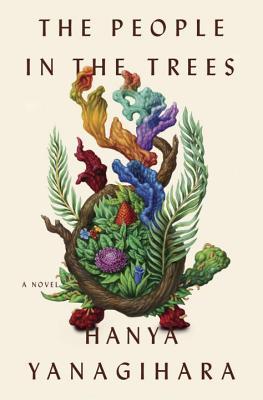In 1950, a young doctor called Norton Perina signs on with the anthropologist Paul Tallent for an expedition to the remote Micronesian island of Ivu'ivu in search of a rumored lost tribe. They succeed, finding not only that tribe but also a group of forest dwellers they dub "The Dreamers," who turn out to be fantastically long-lived but progressively more senile. Perina suspects the source of their longevity is a hard-to-find turtle; unable to resist the possibility of eternal life, he kills one and smuggles some meat back to the States. He scientifically proves his thesis, earning worldwide fame and the Nobel Prize, but he soon discovers that its miraculous property comes at a terrible price. As things quickly spiral out of his control, his own demons take hold, with devastating personal consequences.
Hardcover, 384 pages
Published August 13th 2013 by Doubleday (first published August 1st 2013)
ISBN 0385536771 (ISBN13: 9780385536776)
My Thoughts
I am Ronald Kubodera-- but only in academic journals. To everyone else, I am Ron. Yes, I am the Dr. Ronald Kubodera about whom you have no doubt read in the magazines and newspapers. No, not all the stories are true-- they rarely are, of course.This is the fictional story of scientist Norton Perina's adventures in the fictional islands of U'ivu, the research that developed from his time there, his ethical breaches, awkward social relationships, and unsettling personal life. This book begs the question...
If a great man does unspeakable things, is he still a great man? (p. 2)
This book is loosely based on Nobel laureate Daniel Carleton Gajdusek, who won a Nobel prize in Physiology or Medicine in 1976 for his work on the infectious brain disease kuru, which was prevalent among the South Fore people of New Guinea, and who was later convicted of child molestation in 1996.
Norton was something of a scientific misfit, not respected among his peers, young and inexperienced in much else than killing mice and injecting animals with various things as part of the lab experimentation he performed for a more respected scientist.
Then one day he is sent to the remote Micronesian country of U'ivu, for what reason he does not know. He soon discovers that he is to assist anthropologist Paul Tallent, who is searching for a mysterious tribe that lives on Ivu'ivu, the most remote of the islands of U'ivu. (I know. The names of the islands and the people really confused me. It's like reading a book full of women named Mary, Marie, and Maria!)
While on the island, they discover this "forgotten" tribe of U'ivuans on the island of Ivu'ivu who appear to have abnormally long lifespans that are triple the norm or longer, living 200 or 300 years or more. And Norton theorizes that their long life is connected to their ingestion of a certain turtle. However the same individuals who live extraordinarily long lives are also lost to a serious mental degradation that leaves them stumbling around with severe cases of a condition resembling Alzheimer's.
This book follows Norton over the decades, shifting from his childhood to his professional life, and then ending on a more personal note. It repeatedly made me think of the movie Medicine Man, warning of the risks to our most fragile areas and cultures by drug companies and science. It starts off with news articles about Norton, and a foreword by Norton's friend and colleague Ronald Kubodera, who is the narrator and "editor" of the book. The book is presented as the memoir of Norton, and Kubodera will insert footnotes to further explain things for the reader.
The detail with which the author shares through the narrator boggles my mind. It really feels as if there is a narrator who is commenting and expounding on what is noted by Norton, and that this is a real scientific memoir.
This concept of la-- which Norton here translates as “meaningless”, though others have interpreted it as something closer to the Zen Buddhist concept of mu, or “nothingness”-- is arguably the most important governing principle in traditional U’ivuan philosophy (not to be confused with their mythology, or their religion, which is largely animistic). (p. 111)By page 43, I was noting, "Good...no, great writing...but I'm getting impatient to get to the meat of the story. All of this 'alluding' is driving me nuts!" This was just such an intriguing story, arousing, weird and uncomfortable, and you wanted to find out what would happen next, what was this all about. At times it was quite gripping.
Considering that this novel is written in the form of a memoir, you have to give the fictional character of Norton Perina credit for his honesty. He is unabashed, as a child, in his frank exposure of himself, his thoughts and motivations. He is unapologetic. Well, occasionally he makes excuses, blaming everyone but himself. Other times he accepts responsibility for events, but doesn't really apologize for them. He is simply stating the way it was.
Norton carries an infatuation for the anthropologist Tallent, although it is never clear whether or not it is a romantic infatuation or just admiration and a desire to be what he is-- a “man crush” perhaps. But it becomes evident that Norton is the narrator’s “man crush”-- Norton is Robert Kubodera’s infatuation.
But as I was saying, no, people are not sympathetic to Norton’s current situation. Indeed, people condemned and dismissed him before he was officially condemned and dismissed, legally, by a jury of his supposed peers-- what must it feel like to be a man of Norton’s intellect and have your character determined and your fate writ by twelve incompetents (one juror, as I recall, was a tollbooth clerk, another a dog-washer), whose decision renders virtually every one of your previous accomplishments insignificant, if not entirely meaningless? From that perspective, then, is it any mystery that Norton should now find himself depressed, bored, and unstimulated? (p. 14)
"Is is not relevant whether he did or not,” I said. “Norton is a great mind, and that is all that matters to me and I should say to history as well." (p. 13)Later on Norton begins adopting children from the islands of U'ivu, as things there begin to degrade. Eventually he adopts a total of something like 40 children, offering them a chance at a better life.
My final word: I found this story to be intriguing, and it kept me wondering how it would all play out. However I found it did read something like the scientific memoir it was presented as. And by the end of the book, I noted that it began to feel like one of those movies that winds up being about 20 minutes too long. With 60 pages to go, I was left thinking "How much more can there be? Haven't we covered just about everything?" And yet when those 60 pages ended, I answered "Yes, there really was that much still left in the story!" None of the characters are especially likable, but the story keeps pulling you along, dying to know how this will all play out. By the end of the story, as you are welcomed into Norton's personal life, you find yourself squirming in your seat, sort of uncomfortable in your own skin, almost physically cringing. Was it a fun read? No. At moments it could be touching or beautiful, but often it was awkward, uncomfortable, disturbing and a little stiff. But it was also fascinating, peculiar, and felt almost "profound". While not as beautifully lyrical as Ann Patchet's State of Wonder, I found that I actually enjoyed it more, despite being left with a bad aftertaste. It's an unsettling story, but read it anyway.
Buy Now:
Barnes and Noble
Amazon
Books-a-Million
Indiebound
Cover: A+
Writing Style: A-
Characters: A-
Storyline/Plot: A
Interest/Uniqueness: A
My Rating
Disclosure:
I received a copy of this book to review through Netgalley and the publisher, in exchange for my honest opinion. I was not financially compensated in any way, and the opinions expressed are my own and based on my observations while reading this novel. The book that I received was an uncorrected proof, and any quotes could differ from the print version.





















No comments:
Post a Comment